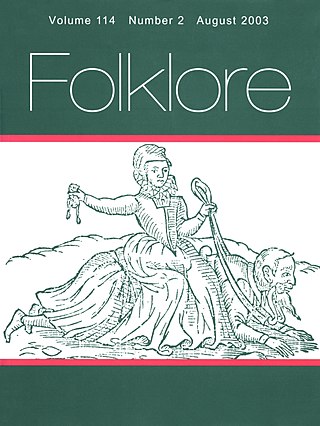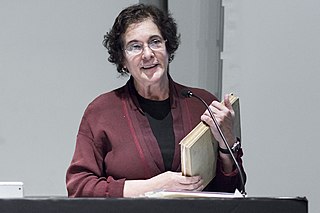Margaret Ann Mills (born 1946) [1] is an American folklorist, and educator. She is a professor emerita of the Department of Near East Languages and Cultures at Ohio State University.
Margaret Ann Mills (born 1946) [1] is an American folklorist, and educator. She is a professor emerita of the Department of Near East Languages and Cultures at Ohio State University.
Margaret Mills was born in 1946 in Boston, Massachusetts. She was raised in Seattle, Washington, where her Italian-born mother was raised. Although both of her parents were physicians, Mills's interests carried her in a different direction.
Margaret Mills graduated cum laude from Radcliffe College in 1968 with a B.A. degree in general studies. She received a PhD (1978) from Harvard University in Comparative Literature and Near Eastern Languages and Culture, with Cultural Anthropology. Mills's dissertation, Oral Narrative in Afghanistan: The Individual in Tradition, was directed by Albert Bates Lord, main proponent of the widely influential oral theory of epic composition.
Mills's field research has focused on folklore of Persia, Afghanistan, the former Soviet Tajikistan, and Pakistan. [2] She has conducted research on the impact of gender in storytelling found within certain cultures. [2] [3]
After graduation, Mills worked for a year as a United States Liaison Officer in Cambridge, Massachusetts, for the University of Mazandaran in Babolsar, Iran.[ when? ] She spent another year as Field Ethnography Consultant for the Denver WIN Field Observation Study. Between May 1980 and April 1982, Mills held a National Endowment for the Humanities (NEH) grant to prepare her second book manuscript.
After one quarter as a visiting lecturer at the University of Washington in the spring of 1982, Mills became Associate Dean of Students and dean of women at Pomona College in Claremont, California.
In 1983, Mills joined the University of Pennsylvania faculty, spending 13 years in the Folklore and Folklife Department. In 1998, Mills joined Ohio State University as professor and chair of the department of Near Eastern languages and cultures (1998 to 2003). At OSU she was a faculty associate of the Center for Folklore Studies and the Mershon Center for Strategic Studies, as well as an adjunct professor of anthropology. Mills retired from Ohio State University in June 2012. After having spent most of her career in Pennsylvania and Ohio, with research years in Afghanistan, Pakistan and Tajikistan, she retired to the Pacific Northwest in June 2012.
Margaret Mills joined the American Folklore Society (AFS) in 1971. Mills served on the AFS Program Committee in 1993 and 2000, on the Long-Range Planning Committee from 1997 to 1999, and on the executive board from 1999 to 2002. In 2012, Mills ran for president of AFS but lost to Michael Ann Williams, head of the department of folk studies and anthropology at Western Kentucky University. [4]
Concerning the future of AFS, Margaret Mills states, "Diversity issues in AFS as in our society at large need more address. We have a (complex) opportunity to make common cause and deepen our conversations with folklorists from abroad whom we invite for AFS meetings and exchange activities." [5]
Dell Hathaway Hymes was a linguist, sociolinguist, anthropologist, and folklorist who established disciplinary foundations for the comparative, ethnographic study of language use. His research focused upon the languages of the Pacific Northwest. He was one of the first to call the fourth subfield of anthropology "linguistic anthropology" instead of "anthropological linguistics". The terminological shift draws attention to the field's grounding in anthropology rather than in what, by that time, had already become an autonomous discipline (linguistics). In 1972 Hymes founded the journal Language in Society and served as its editor for 22 years.

Folklore studies is the branch of anthropology devoted to the study of folklore. This term, along with its synonyms, gained currency in the 1950s to distinguish the academic study of traditional culture from the folklore artifacts themselves. It became established as a field across both Europe and North America, coordinating with Volkskunde (German), folkeminner (Norwegian), and folkminnen (Swedish), among others.
Jack David Zipes is a literary scholar and author. He is a Professor Emeritus in the Department of German, Nordic, Slavic and Dutch at the University of Minnesota.

Lila Abu-Lughod is a Palestinian-American anthropologist. She is the Joseph L. Buttenweiser Professor of Social Science in the Department of Anthropology at Columbia University in New York City. She specializes in ethnographic research in the Arab world, and her seven books cover topics including sentiment and poetry, nationalism and media, gender politics and the politics of memory.
Erminie Wheeler-Voegelin was an American award-winning anthropologist, folklorist, and ethnohistorian.

Sabina Magliocco, is a professor of anthropology and religion at the University of British Columbia and formerly at California State University, Northridge (CSUN). She is an author of non-fiction books and journal articles about folklore, religion, religious festivals, foodways, witchcraft and Neo-Paganism in Europe and the United States.
Richard Bauman is a folklorist and anthropologist, now retired from Indiana University Bloomington. He is Distinguished Professor emeritus of Folklore, of Anthropology, and of Communication and Culture. Before coming to IU in 1985, he was the Director of the Center for Intercultural Studies in Folklore and Ethnomusicology at the University of Texas and a faculty member in the UT Department of Anthropology. Just before retiring from Indiana, he was chair of the IU Department of Folklore and Ethnomusicology, as well as an important member of the Department of Anthropology and the Department of Communication and Culture.
John Holmes McDowell is a Professor in the Department of Folklore and Ethnomusicology at Indiana University Bloomington. He also serves as Director of the Diverse Environmentalisms Research Team (DERT) headquartered at Indiana University. Broadly speaking his work is centered on performance and communication as well as the interplay of creativity and tradition. Geographically most of his fieldwork has been in Mexico, Colombia, Cuba, Ecuador, and Ghana. His interests include Speech play and verbal art; the corrido of Greater Mexico; music, myth, and cosmology in the Andes; ecoperformativity; commemoration; folklorization; ethnopoetics; Latin America; the United States.
Dorothy Noyes is an American folklorist and ethnologist whose comparative, ethnographic and historical research focuses on European societies and upon European immigrant communities in the United States. Beyond its area studies context, her work has aimed to enrich the conceptual toolkit of folklore studies (folkloristics) and ethnology. General problems upon which she has focused attention include the status of "provincial" communities in national and global contexts, heritage policies and politics, problems of innovation and creativity, and the nature of festival specifically and of cultural displays and representations generally.
Hasan M. El-Shamy is a professor of folklore (folkloristics) in the Department of Folklore and Ethnomusicology, the Department of Near Eastern Languages and Cultures, and the African Studies Program at Indiana University. He received a B.A. with honors in Arabic and Islamic studies from Ain-Shams University in Cairo, Egypt in 1959. He then completed an intensive graduate program in psychology and education from Ain-Shams (Heliopolis) University in 1959–1960. Later he received an M.A. in folklore from Indiana University in 1964, as well as a Ph.D. in folklore with interdisciplinary training in folklore, psychology, and anthropology from Indiana University in 1967. El-Shamy is retired and professor emeritus at Indiana University Bloomington.
Roger David Abrahams was an American folklorist whose work focused on the expressive cultures and cultural histories of the Americas, with a specific emphasis on African American peoples and traditions.
Erika Eichhorn Bourguignon was an Austrian-born American anthropologist known primarily for her work on possession trance and other altered states of consciousness. She was “considered the premier anthropological authority on trance, possession, and altered states of consciousness” and "one of the founders of the field of anthropology of consciousness." She was born in Vienna, Austria, but left with her parents in 1938. After receiving a B.A. from Queens College in 1945, she began graduate studies at Northwestern University, working there under Melville J. Herskovits and Alfred Irving Hallowell. She did field research among the Chippewa in Wisconsin and in Haiti (1947–48).
Family folklore is the branch of folkloristics concerned with the study and use of folklore and traditional culture transmitted within an individual family group. This includes craft goods produced by family members or memorabilia that have been saved as reminders of family events. It includes family photos, photo albums, along with bundles of other pages held for posterity such as certificates, letters, journals, notes, and shopping lists. Family sayings and stories which recount true events are retold as a means of maintaining a common family identity. Family customs are performed, modified, sometimes forgotten, created or resurrected with great frequency. Each time the result is to define and solidify the perception of the family as unique.

Kay Turner is an artist and scholar working across disciplines including performance, writing, music, exhibition curation, and public and academic folklore. She is noted for her feminist writings and performances on subjects such as women’s home altars, fairy tale witches, and historical goddess figures. She co-founded “Girls in the Nose,” a lesbian feminist rock punk band that anticipated riot grrl.
Barbara Ann Babcock was an American folklore scholar, professor of Comparative Cultural and Literary Studies, Women's Studies, and American Indian Studies at the University of Arizona.
Susan Snow Wadley is an American anthropologist.
Anna Hadwick Gayton (1899–1977) was an American anthropologist, folklorist and museum curator. She is most recognized for her role in "compiling and analyzing Californian Indian mythology" and was elected President of the American Folklore Society in 1950.
Joan Newlon Radner is an American folklorist, storyteller and oral historian. She is Professor Emerita at American University in Washington, DC.
Michael Ann Williams is an American Folklorist, recognised for her research into vernacular architecture, particularly in Appalachia.
C. Kurt Dewhurst is an American curator and folklorist. Dewhurst is Director for Arts and Cultural Partnerships at Michigan State University (MSU) and also a Senior Fellow in University Outreach and Engagement. At MSU, he is also Director Emeritus of the Michigan State University Museum and a Professor of English and Museum Studies.